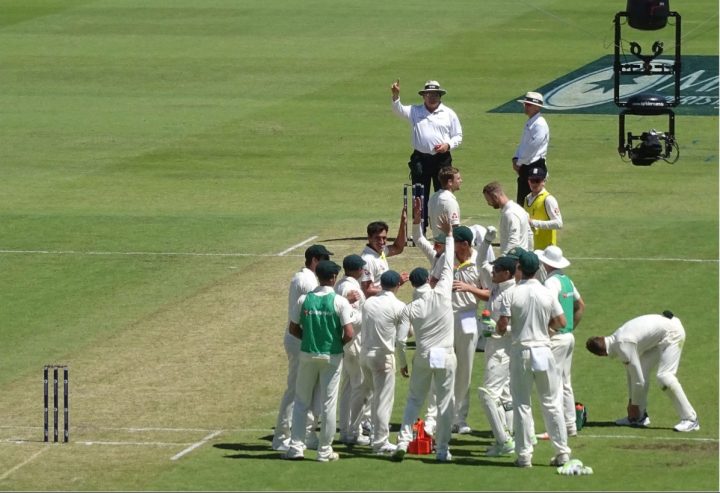Andrew Strauss has been spending some time with the media recently. It’s always interesting to hear him speak. Although I don’t always agree with everything he says – I sometimes feel that he over-complicates things and makes simple ideas sound more complex than they really are – I find it reassuring that he obviously cares a great deal about the England side, and that he takes his role extremely seriously.
After the days of Ted ‘let’s call up Martin McCaddick’ Dexter, when English cricket seemed to be run by amateurs, it’s good to know that Strauss is thinking hard about England’s future and is prepared to do his due diligence. He’s obviously a very thoughtful and intelligent man, and I’d much rather see a somewhat cerebral man in charge than somebody purely instinctive and gung-ho.
You’ll see I’ve embedded one of the more interesting parts of his recent interview below. It reveals Strauss thoughts on team culture. I think many of you will find it enlightening, not to mention eyebrow raising.
When it comes to team culture, Strauss believes that England and Australia have similar values and share a common outlook. I’m not too sure about this. The Aussies aren’t exactly known for playing the kind of attritional and patient cricket that won England the Ashes under Strauss and Flower. I’ve always regarded Australian cricketers as more aggressive and naturally positive than their English counterparts.
The second interesting titbit concerns the role of individuals within this team culture. Strauss doesn’t believe there’s any such thing as a surefire blueprint for creating a good culture and environment. Instead he talks about the little things including, incidentally, the need to foster a sense of inclusivity amongst the players – so they all feel as though they belong.
As well as understanding that players are people rather than ‘commodities’, I’m guessing inclusivity also entails senior players spending time with the younger guys, and everyone communicating openly and honestly so that different views are heard. I’m not sure how coaches and captains can create a sense of inclusivity without this? Of course, one shouldn’t forget that views must be expressed at the right time, in the right manner.
Strauss’s words certainly offer food for thought. I wonder if his personal view of ‘team culture’, and how one might create a good and successful one, differed from Paul Downton’s model?
James Morgan
@DoctorCopy









“Ah, they’ve got a strong culture”
“Get them to buy into what you’re trying to do”
If this is what passes for “intelligence” these days – and we all know that it is, if anyone has had any experience of a limited middle-manager bossing them around recently – then god help us. And not just in the cricket sphere.
Your subtle points about the disjunction between his words and semi-recent decisions taken about the team are spot on.
we seem to see the start of the development of the real story. The “Team” did not like KP. KP fostered bonds with the youngsters and outsiders – Simon Jones, Harmison, Compton, Carberry all have said good things about him. Brearley hinted at the same thoughts in his interview – too many cliques going in different directions. Where was the real management?
Trust is what counts.
So Strauss thinks team should be “happy families” does he? How can they do that when the boys all saw what happened to KP for daring to question things that he knew were wrong , to try and assist them when he saw they wanted advice.They know not to open their mouths if they want to play not to mention watching their backs. As for “trust” may I say the “trust” the ECB has shown to KP and others leaves one stunned.They and Strauss should hang their heads in shame. Strauss is happily wearing the Ashes victory when he must know they did not play well and could just as easily lost.What will he do when the team struggle in UAE and SA? Sweep the losses under the carpet as they have done Lords , Oval and the two ODIs.Just pretend they didn’t happen just as they pretend KP no longer exists in cricket. I say Shame Strauss,Where’s your conscience.KP was once a friend, you played a lot of cricket together how could you destroy him the way you have and not care that people can see the hate. Shame
I think Strauss’s views on Pietersen were shaped in large part by textgate. This proved to him that KP was not pulling in the right direction. The fact that the KP Genius Twitter account was publically mocking him, and (a) this explained his behaviour to a significant extent, and (b) demonstrated that other players weren’t buying into the culture of inclusivity either, seems to have been ignored. However, I wouldn’t be surprised if Pietersen was choosing the wrong moments, and or conveying his points in the wrong way, if / when he was asked for his opinions on team matters.
However, I don’t want this thread to become entirely about Pietersen. The broader point is the elements that make up ‘team culture’. What exactly are they if Strauss himself struggles to define it or even set out steps that can create it? For example, we often hear that the best coaches simply help players relax and tell them to ‘go out and express themselves’ and ‘play their natural game’. To me this sounds incredibly simplistic – call it the Kevin Keegan or Harry Redknapp school of management – and certainly not worth the massive salaries involved.
On the flip side, wouldn’t Andy Flower (who was very successful mostly) argue that such a culture is counter productive? Flower was all about discipline etc as have several top coaches in other sports. So which way is the right way?
Perhaps there is no right way, it all comes down to circumstances and chemistry – which implies a level of good fortune. In which case, isn’t all this talk of culture and methodology essentially a bit futile and random?
Flower on “Culture”:
https://www.youtube.com/watch?v=9RkoWjv3iLs
This is were Strauss gets his soundbites
Completely agree with you Julie. I have exactly zero admiration for Strauss.
K P is a handy player for every format. decision against him need to review once again. from my side he has to comeback to all formats.
Yeah ..! I agree with you.
The guy is deluded, such a sense of over inflated self importance. The only positive about his role is that we don’t have to hear his mealy mouthed commentary on Sky, good riddance
Not nice!!! Do you know him???
Strauss effectively said yesterday that Pietersen is not coming back in any circumstances.
The PA reported him saying, “I think the danger at that time is that particular issue would overshadow everything that happened on the pitch over the course of the summer. I would hate to say just because I made that decision we won the Ashes; I don’t think that’s true at all. What I was trying to do was provide clarity going forward, so everyone knew where they stood and that could allow the players to concentrate on what was going on in the middle rather than some of the other stuff that was surrounding. I think that clarity has helped, to be honest, but it’s up to the players to go out and perform.”
He added: “I think the team has moved on and the team is in a pretty good place. I think some of those young guys have established themselves. You look at Joe Root, Ben Stokes, Moeen Ali as three guys over the past 18 months that have really come through and have the makings of top-quality international players. That’s what we will be focusing on taking England forward.”
What I was trying to do was provide clarity going forward, so everyone knew where they stood…
An interesting (and self-serving) spin on the ECB establishing the precedent that they can declare a player excluded from selection for the rest of his career.
And he didn’t provide any clarity at all. In April he didn’t say why Pietersen was not eligible for selection – nor confirm whether it was forever or might be reviewable. He accomplished the extraordinary feat of making the waters even muddier.
Perhaps he meant that he made it clear the KP was banned, that that was the end of it, and that if anyone asked him about it he was going to stonewall them with management speak.
He threw that presser in the hope that it would, long term, reduce public speculation on the amazing shittiness of the ECB’s management and selection performance.
I think we’ve been pretty clear ever since “c#nt”….
That Strauss presser in full :
“Hi everyone, today I’m going to tell you exactly what I meant when I said Kevin was a c*nt.
Well the thing is, he’s really a bit socially abrasive at times and it really pissed quite a few of us off and we’d rather we didn’t have him around any more, annoying us all and putting us off and potentially shoring up our woeful top order batting.”
I wish Strauss wasn’t coming back under any circumstances, along with his cabal.
Strauss may think that England have moved on without Pietersen, but who has actually replaced him in the batting order?
Joe Root was in the team before Pietersen was sacked.
Stokes is not making as many runs as Pietersen used to. Pietersen’s effective direct replacements have been Ballance, who’s been dropped, and now Bairstow, who has far from sealed his place.
Nineteen months since firing Pietersen, there is still a Pietersen-shaped hole in the batting order. This is a simple and irrefutable cricketing fact.
I used to be a huge admirer of Strauss, but in retirement he has proved to be the same old kind of golf-club-bar-bore who’s run English cricket since time immemorial, whose natural approach is to pass of quarter-baked bigotry and lazy prejudice as professional judgement.
All cricket matches are won by runs and wickets alone. Faddish modern theories of team culture are nothing more than an asinine and unimaginative attempt to translate management theory into the completely different environment of international sport, which is far more akin to the creative arts than business or industrial processes.
It is certainly true that players need to be given confidence, mentoring and support, and made to feel welcome and at ease in the dressing room, in order to perform well, but this is simple common sense and human decency – not rocket science.
Few of the great champion teams of cricket history enjoyed a unifying or coherent team culture. They just played good cricket. Don Bradman did not share the philosophy of his team-mates and never immersed himself in the supposed culture of the team – which didn’t stop them ruling the world.
In a vague prefigurement of the infamous Jason Gallian kitbag incident, when Bradman was dismissed for a duck at the Oval in 1948, Fingleton and O’Reilly, in the press-box, and former team-mates burst out laughing.
he takes his role extremely seriously.
He takes himself extremely seriously.
Test – please ignore.
Ignore this too.
And this. Sorry – all will be revealed soon!
This is more exciting than the Ashes was!
All will be revealed soon? Yeah, that’s what the ECB told us
:)
I’ve got to admit that it has become a bit of a bugbear of mine the overall lionisation of Andrew Strauss and his role in the very successful England era from 2009-11. Although he undoubtedly did a good role in helping to bind the team together after the fall-out of the Moores and Pitersen debacle and played a leading role in the 2-1 victory in the 2009 Ashes it was nigh on downhill from that point on for him as a batsman.
There was little innovation in the tactics and the use of his bowling, he relied on Anderson and Swann being at the very peak of their powers and they rarely let him down. I find it astonishing that more than a few people had a chip on their shoulder about Michael Vaughan and had high opinions of Strauss’s leadership when what he was was a steady hand on the till rather than a particularly innovative captain.
As well as that there was a bit of an airbrushing of the 3-0 whitewash in the Emirates, by which time it was clear to me that he was becoming an increasing liability as a batsman. He managed to get a couple of tons versus a weak West Indies bowling line-up but was always going to be cannon-fodder for the 3rd series in a row for Morkel and co later on that year. If people are daft enough to think that ‘textgate’ finished him before his time I think they really had forgotten his actual contributions at the time. It was also clear that both he and Flower did not have a plan B, let alone the management skills to keep control of their players. The lack of analysis by some folk over Strauss’s role without bringing up Pietersen is truly pathetic.